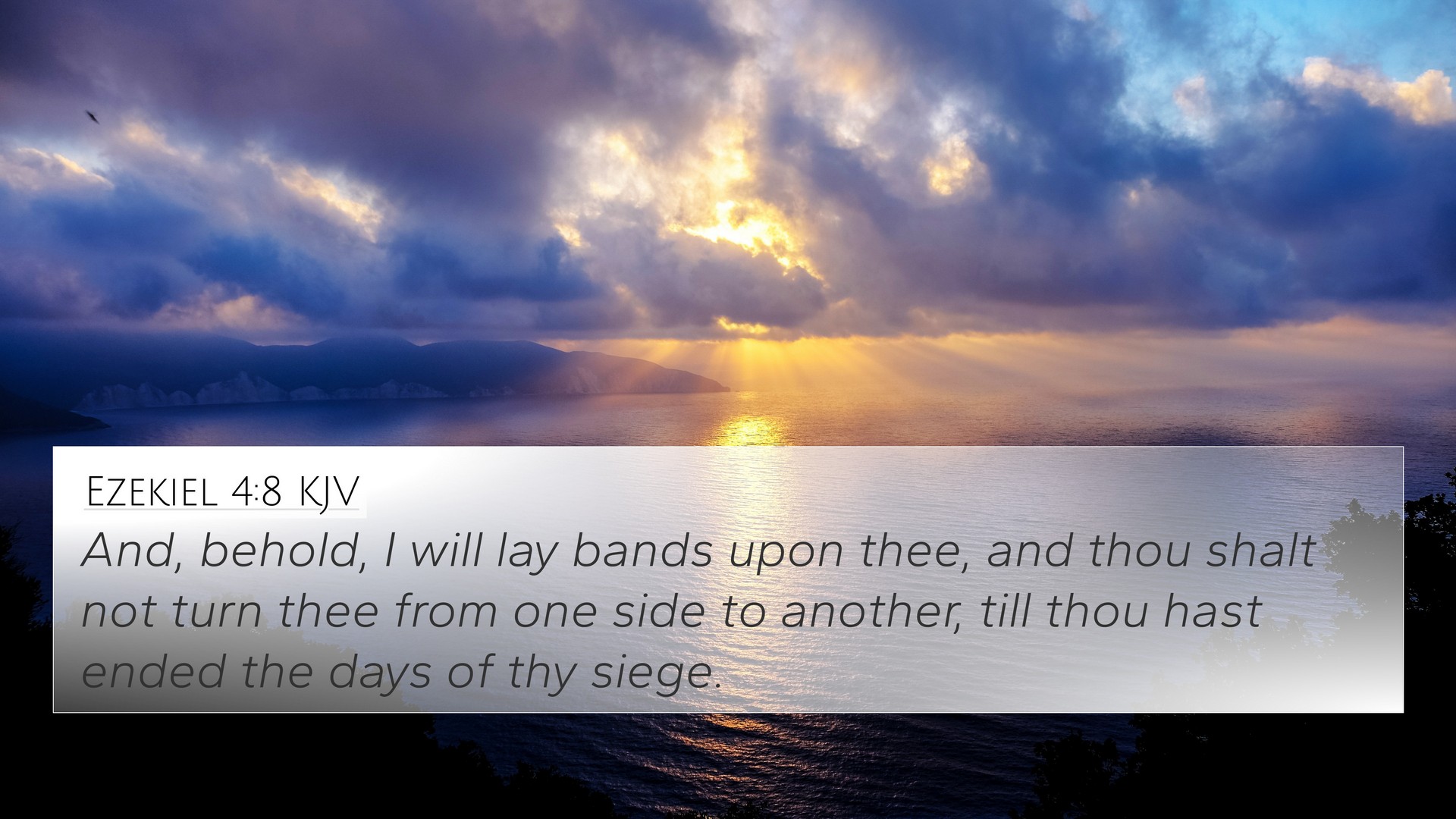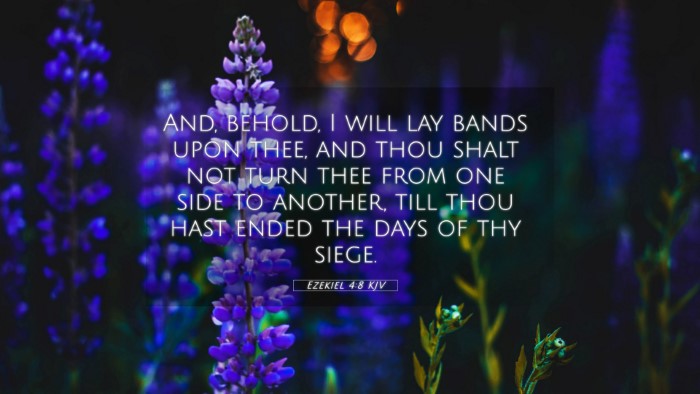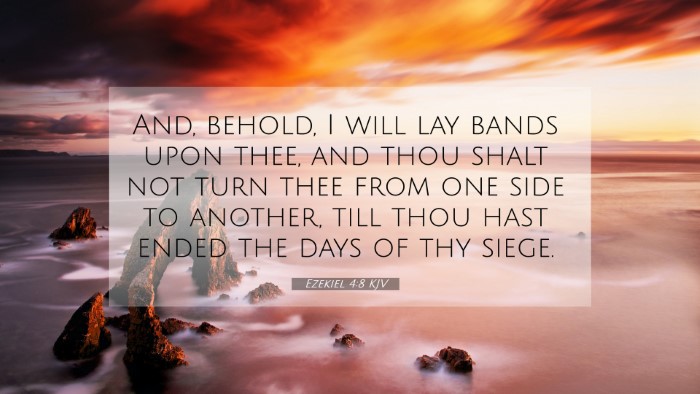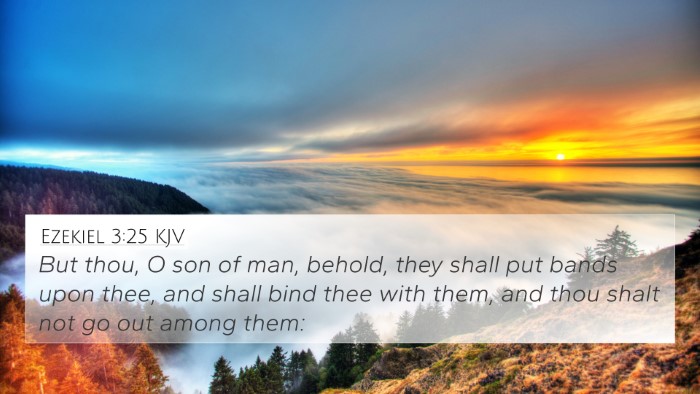Ezekiel 4:8 reads: "And I will lay bands upon thee, and thou shalt not turn thee from one side to another, till thou hast ended the days of thy siege."
This verse encapsulates a significant moment in Ezekiel's prophetic ministry, where God is communicating both judgment and discipline through vivid imagery and actions.
Meaning and Interpretation
The verse offers a profound exploration of the themes of constraint and divine instruction. Several public domain commentaries elucidate these meanings:
- Matthew Henry: Henry interprets the bands laid upon Ezekiel as a sign of the rigors of God’s judgment upon the people of Israel. The divine command to remain in one position symbolizes the unyielding nature of their siege, reflecting the inevitable consequences of sin and disobedience. The prophet's role becomes one of embodying this message, portraying both the grief of God and the seriousness of the coming destruction.
- Albert Barnes: Barnes emphasizes that Ezekiel’s actions were allegorical, representing the siege that would come upon Jerusalem. The directive to remain in one position signifies the complete and utter dominance of the siege over the people. This physical restriction illustrates the spiritual and national consequences faced by the nation due to their covenant infidelity.
- Adam Clarke: Clarke comments on the stringent and specific instructions given to Ezekiel. The bands placed on him serve to illustrate the helplessness of the Israelites during their siege. It teaches the point of how God’s judgment involves not only devastation but also a form of confinement that results in reflection and acknowledgment of wrongdoing.
Thematic Connections
The themes reflected in Ezekiel 4:8 can be explored through various Bible verses that express similar ideas. Here are some biblical cross-references:
- Lamentations 3:7: "He hath hedged me about, that I cannot get out: he hath made my chain heavy." This verse reflects the theme of confinement and the oppression felt during judgment.
- Ezekiel 3:25-27: These verses highlight Ezekiel's physical restraints and the restrictions on his speech, which parallel the constraints mentioned in Ezekiel 4:8, further showing the severity of God’s prophetic message.
- Jeremiah 1:17: "Thou therefore gird up thy loins, and arise, and speak unto them all that I command thee." This verse underlines the theme of being prepared to communicate God’s word amidst oppression.
- Isaiah 21:3: "Therefore are my loins filled with pain: pangs have taken hold upon me, as the pangs of a woman that travaileth." Isaiah’s depiction of divine burden illustrates the physical emotions associated with prophetic duty.
- Romans 8:35: "Who shall separate us from the love of Christ? Shall tribulation, or distress, or persecution, or famine, or nakedness, or peril, or sword?" This reflects the relentless challenges faced by believers, tying into the theme of enduring through hardship.
- Revelation 2:10: "Fear none of those things which thou shalt suffer: behold, the devil shall cast some of you into prison, that ye may be tried; and ye shall have tribulation ten days: be thou faithful unto death." This verse conveys the perseverance under spiritual siege, akin to Israel's plight under judgment.
- Hebrews 12:1: "Wherefore seeing we also are compassed about with so great a cloud of witnesses, let us lay aside every weight, and the sin which doth so easily beset us, and let us run with patience the race that is set before us." This encourages believers to endure through trials, akin to the constraints experienced by Ezekiel.
Cross-Referencing Biblical Texts
This process of cross-referencing not only elucidates the meaning of individual verses but also enriches the understanding of the larger thematic discourse throughout the Bible. In doing comparative Bible verse analysis, we see how:
- Ezekiel's Exile: The overarching narrative regarding exile and siege is pivotal in understanding both the historical context of Ezekiel and its theological implications.
- Divine Instruction: Every instance where God instructs His prophets reflects His desire for His people to see the weight of their sin and the impending consequences, much like in Ezekiel 4:8.
- Call to Repentance: Each prophetic declaration ultimately drives towards a call for repentance and awareness, focusing on the unwavering love God has for His people despite their failings.
Conclusion
Ezekiel 4:8 serves as a potent reminder of the severity of God's message through His prophets. The band symbolizing restraint, the prolonged siege, and Ezekiel's physical embodiment of the prophetic word invites deeper reflection into the nature of divine judgment and mercy. For those seeking to understand the nuances and connections within scripture, cross-referencing becomes a vital tool that reveals the intricate fabric of God’s redemptive narrative across both the Old and New Testaments.
Such deep dives into comparative Bible verse analysis provide the reader not only with valuable insights but also encourage a thorough engagement with the biblical text. For anyone exploring biblical themes, the study of connections between Bible verses offers transformative perspectives on God's consistent character and message throughout history.



